Harvard Medical School. Fact & Figures.
Sections for Harvard University
- About Harvard University.
- About Harvard University. Information.
- Harvard Medical School. Fact & Figures.
- Harvard Medical School. Generations of Leaders.
- Harvard School of Public Health (HSPH).
- Harvard School of Public Health (HSPH). History of the School.
- The Forum at Harvard School of Public Health
Harvard University. Harvard Medical School. Fact & Figures.
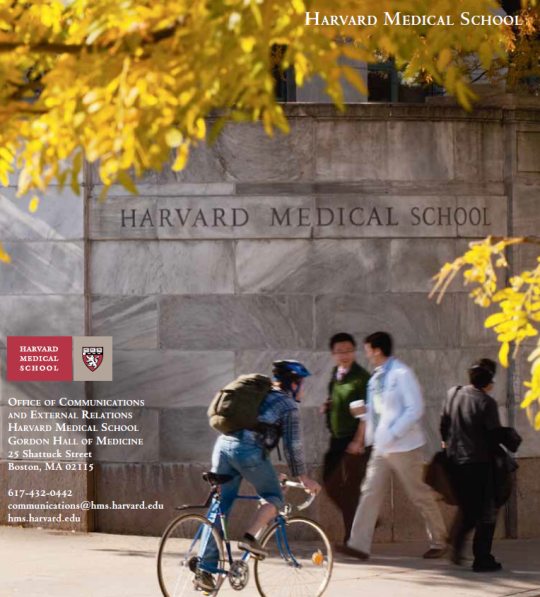
Based in the Longwood Medical Area, the School has faculty, staff, students and trainees active on the main campus and at 17 affiliated hospitals and research institutes in the Boston area. We are committed to serving society by training physicians and scientists and by making discoveries and translating them into better prevention and clinical care.
Over the past year—despite the global economic crisis— we have made remarkable progress in advancing our key priorities. Faculty and staff confronted unprecedented constraints with vision and optimism, and, together, we put the School on a better financial footing. At the same time, we made steady progress toward the School’s strategic goals. We could not have managed these circumstances so well without the dedication and creativity of our School community.
I am grateful for the opportunity to work with men and women whose commitment to a shared mission not only strengthens the School but supports the well-being of people in the United States and around the world.
With best wishes,
Jeffrey S. Flier, MD
Dean of the Faculty of Medicine
Harvard University


> FACTS & FIGURES
>> Harvard Medical School (HMS). Mission.
To create and nurture a diverse community of the best people committed to leadership in alleviating human suffering caused by disease.
>> Harvard Medical School (HMS). Founding.
Established September 19, 1782
>> Harvard Medical School (HMS). Leadership.
Jeffrey S. Flier, MD
Dean of the Harvard University Faculty of Medicine
>> Harvard Medical School (HMS). Academic Deans.
William W. Chin, MD
Executive Dean for Research
Maureen Connelly, MD, MPH
Dean for Faculty Affairs
Jules Dienstag, MD
Dean for Medical Education
David E. Golan, MD, PhD
Dean for Graduate Education
Lee Nadler, MD
Dean for Clinical and Translational Research
Nancy Oriol, MD
Dean for Students
Joan Reede, MD, MS, MPH, MBA
Dean for Diversity and Community Partnership
Nancy J. Tarbell, MD
Dean for Academic and Clinical Affairs
R. Bruce Donoff, DMD, MD
Dean of the Harvard School of Dental Medicine
>> Harvard Medical School (HMS). Administrative Deans.
Richard G. Mills, JD
Executive Dean for Administration
Wesley Benbow, MBA
Associate Dean for Finance and Chief Financial Officer
Gretchen Brodnicki, JD
Dean for Faculty and Research Integrity
Judith Glaven, PhD
Associate Dean for Basic and Interdisciplinary Research
John Halamka, MD
Chief Information Officer
Lisa Muto, PhD
Associate Dean for Institutional Planning and Policy
Susan Rapple
Dean for Resource Development
Richard Shea
Associate Dean for Physical Planning and Facilities
Julie Stanley
Chief Human Resources Officer
Gina Vild
Associate Dean for Communications and External Relations
and Chief Communications Officer
>> Harvard Medical School (HMS). Preclinical Department Chairs.
Joan Brugge, PhD
Louise Foote Pfeiffer Professor of Cell Biology
Chair, Cell Biology
Paul Farmer, MD, PhD
Kolokotrones University Professor of Global Health and Social Medicine
Chair, Global Health and Social Medicine
Michael Greenberg, PhD
Nathan Marsh Pusey Professor of Neurobiology
Chair, Neurobiology
Stephen Harrison, PhD
Giovanni Armenise-Harvard Professor of Basic Biomedical Science
Acting Chair, Biological Chemistry and Molecular Pharmacology
Marc Kirschner, PhD
John Franklin Enders University Professor of Systems Biology
Chair, Systems Biology
Barbara McNeil, MD, PhD
Ridley Watts Professor of Health Care Policy
Chair, Health Care Policy
John Mekalanos, PhD
Adele Lehman Professor of Microbiology and Molecular Genetics
Chair, Microbiology and Immunobiology
Doug Melton, PhD
Xander University Professor
David Scadden, MD
Gerald and Darlene Jordan Professor of Medicine
Co-chairs, Stem Cell and Regenerative Biology
Clifford Tabin, PhD
George Jacob and Jacqueline Hazel Leder Professor of Genetics
Chair, Genetics
>> Harvard Medical School (HMS). Collaborations Across Harvard.
Broad Institute of MIT and Harvard
Harvard Catalyst
Harvard Stem Cell Institute
Wyss Institute for Biologically Inspired Engineering
>> Harvard Medical School (HMS). HMS by the Numbers.
Total faculty 11,860 | Tenured and tenure-track faculty on the HMS campus, in 9 preclinical departments 166 | Voting faculty, campus and affiliates 4,980 Full-time faculty, campus and affiliates 8,924
Nobel Prizes (Medicine or Physiology; Peace) 9 prizes; 15 recipients | Howard Hughes Medical Institute investigators 30 | Members, Institute of Medicine 115 | National Academy of Sciences 62
Total MD students 709 | Total PhD students 582 *MD-PhD Basic sciences 150 | Social sciences 19 (*included in MD and PhD totals) | Total DMD students 150 | Trainees (residents and postdoctoral fellows) 9,376
Entering MD students, 2011:
MD (includes 13 MD-PhD) 165 | Applicants 5,435 | Admitted 223 (4.1%) | Matriculated (includes 13 MD-PhD) 165 | Men 88 (53%) | Women 77 (47%) Underrepresented in medicine (African American, Native American, Hispanic) 31(19%) | Asian 56 (34%)
Entering PhD and DMD students, 2011:
PhD 105 | DMD 35 |
Additional joint-degree programs:
MD-MBA; MD-MPH; MD-MPP
Medical school alumni 9,582 (MD and MMS degrees)
>> Harvard Medical School (HMS). Fundraising Highlights.
Harvard Medical School depends upon thousands of friends, alumni, organizations, faculty and staff to advance the School’s groundbreaking work in biomedical research and its unparalleled programs in medical and graduate education. In fiscal year 2011, gifts and pledges to the School totalled $95 million. To read and download the School’s annual Honor Roll of Donors, published by the Office for Resource Development, visit http://give.hms.harvard.edu/honor-roll
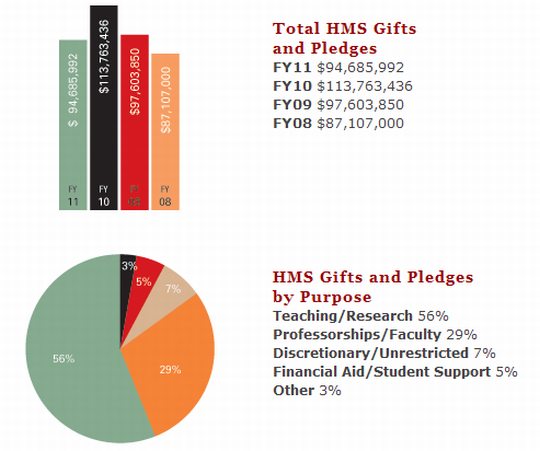
>> Harvard Medical School (HMS). Financial Report.
Harvard Medical School ended fiscal year 2011 with an increase in net assets of $0.9 million, a significant improvement over 2010.
Operating revenues totaled $655.3 million, an increase of 11 percent. Sponsored research revenue grew by 9 percent, largely due to continued success in obtaining federal stimulus funding for research through the American Recovery and Reinvestment Act. Other factors contributing to this positive scenario were a change in accounting for Harvard Health Publications (HHP), philanthropic support for the new Center for Primary Care and support from School-affiliated institutions.
Total operating expenses rose by 6 percent, to $654.4 million, largely due to higher grant volume in sponsored research, the accounting restatement for HHP and new scientific collaborations across Harvard University. Overall growth in expenditures was partly offset by a reduction in annual debt service following a strategic outlay in 2010 to lower total debt.
HMS continues to make strides towards a sustainable financial future. At the same time, the School remains committed to providing an affordable education for students, and to investing in its world-class faculty, laboratories and facilities.
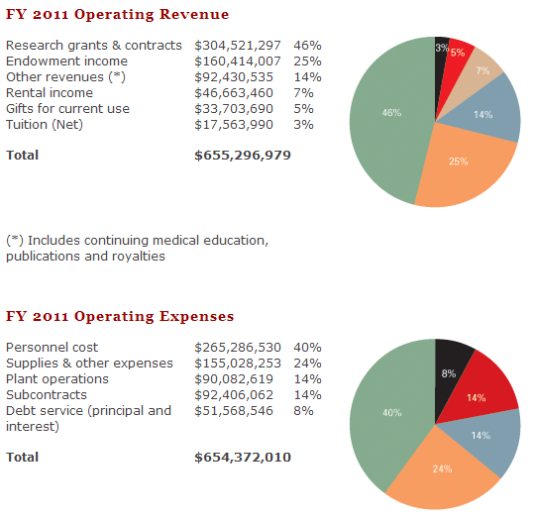
>> Harvard Medical School (HMS). MD Financial Aid (Fiscal Year 2009).
Average scholarship $33,430
Annual unit loan $24,500
Students receiving financial aid
(excluding MD–PhD students) 81%
Students graduating with loans 133
Average loan debt on graduation $103,663
Range of debt (Class of 2009) $1,547–$249,664
>> Harvard Medical School (HMS). Tuition and Fees (2009–2010).
Tuition $42,500
Fees $3,333
>> Harvard Medical School (HMS). Continuing Education.
Courses offered (including home-study courses) 273
New courses 58
Attendees 59,367
States represented (plus D.C. and Puerto Rico) 50
Countries represented 110
>> Harvard Medical School (HMS). Affiliated Hospitals and Research Institutions.
Beth Israel Deaconess Medical Center
Brigham and Women’s Hospital
Cambridge Health Alliance
Children’s Hospital Boston (whose Program in Cellular and Molecular Medicine forms the Immune Disease Institute)
Dana-Farber Cancer Institute
The Forsyth Institute
Harvard Pilgrim Health Care
Hebrew SeniorLife
Joslin Diabetes Center
Judge Baker Children’s Center
McLean Hospital
Massachusetts Eye and Ear Infirmary
Massachusetts General Hospital
Mount Auburn Hospital
Schepens Eye Research Institute
Spaulding Rehabilitation Hospital
VA Boston Healthcare System
Harvard Longwood Campus
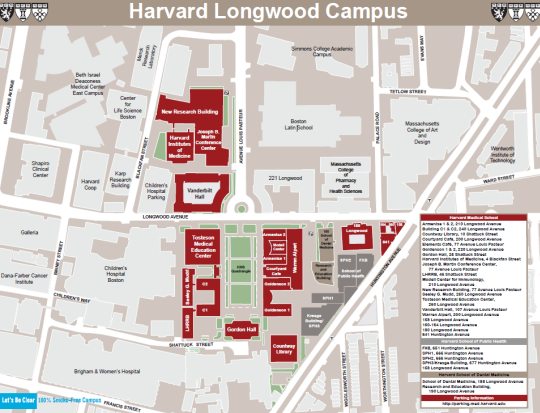
Affiliated Hospitals and Research Institutions.
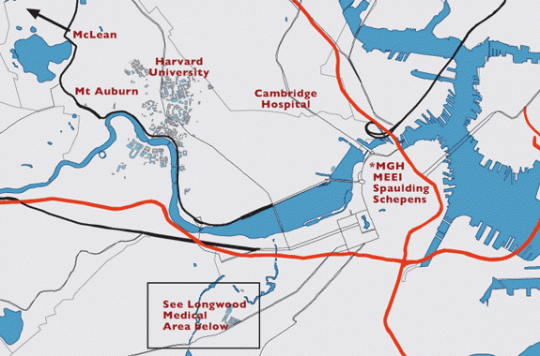
* Mass. General Hospital, Mass. Eye & Ear Infirmary,
Spaulding Rehab Hospital, Schepens Eye Research Institute
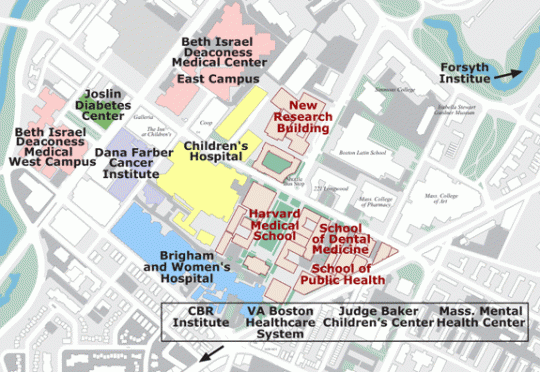
>> Harvard Medical School (HMS). Centers, Divisions and Institutes.
Armenise–Harvard Foundation (which supports seven centers at HMS for collaborations between scientists at the School and leading institutions in Italy)
Center for Integration of Medicine and Innovative Technology (CIMIT)
Center of Excellence in Minority Health and Health Disparities at HMS
Dana–Farber/Harvard Cancer Center
Harvard Catalyst: The Harvard Clinical and Translational Science Center
Harvard Center for Immunodeficiency
Harvard Clinical Research Institute
Harvard Division of Health Policy Research and Education
Harvard Humanitarian Initiative
Harvard Mahoney Neuroscience Institute
Harvard Medical School Dubai Center
Harvard–MIT Division of Health Sciences and Technology
Harvard NeuroDiscovery Center
Harvard Skin Disease Research Center
HMS Center for Biomedical Informatics
HMS Center for Health and the Global Environment
HMS Center for Hereditary Deafness
HMS Center for Neurofibromatosis and Allied Disorders
HMS Center for Palliative Care
HMS Division for Research and Education in Complementary and Integrative Medical Therapies
HMS Division of AIDS
HMS Division of Emergency Medicine
HMS Division of Medical Ethics
Harvard Division of Nutrition
HMS Division of Service Learning
HMS Division of Sleep Medicine
HMS Division on Primary Care
HSDM and HMS Center for Craniofacial Tissue Engineering
ICCB-Longwood Screening Facility
Juvenile Diabetes Research Foundation Center on Immunological Tolerance in Type 1 Diabetes at HMS
MIT/HMS Center for Magnetic Resonance
New England Primate Research Center
New England Regional Center of Excellence: Biodefense and Emerging Infectious Diseases (NERCE/BEID)
>> Harvard Medical School (HMS). Library.
The Countway Library comprises the Harvard Medical School library and Boston Medical Library
Users per day 615
Electronic journals (access) >10,000
Databases for online services 149
Electronic textbooks 1,114
Owned by the Countway Library
Volumes 695,749
Monographs 213,328
Journal volumes 482,421
Rare books 212,083
Total linear feet of manuscripts and archives 14,005
Total number of objects held by the Warren Anatomical Museum 9,030
Special Collections (available through Countway)
History of medicine (802 incunabula)
European books printed 16th–20th centuries
English books published 1475–20th century, American books 18th–20th centuries, Bostoniana
Medical Hebraica and Judaica 14th–20th centuries
Manuscripts and archives, especially of New England origin (20 million items)
Medical library of Oliver Wendell Holmes (900 titles)
Warren Library of early works in surgery (2,000 volumes)
Friedrich Tiedemann collection of anatomy and physiology (4,000 items)
Historical Collection in Radiology
National Archives of Plastic Surgery
Medical prints, photographs and artwork (35,000)
Renowned collection of medical medals (6,000)
Archives of Harvard Medical School, Harvard School of Dental Medicine and Harvard School of Public Health
The Archives for Women in Medicine
>> Harvard Medical School (HMS). Nobel Laureates.
Fifteen researchers have shared in nine Nobel prizes for work done while at HMS.
George Minot and William P. Murphy, 1934, Physiology or Medicine
Research on liver treatment of the anemias
Fritz A. Lipmann, 1953, Physiology or Medicine
Identified coenzyme A and discovered basic principles of the way cells generate energy
John F. Enders, Frederick C. Robbins* and Thomas H. Weller, 1954, Physiology or Medicine
Application of tissue-culture methods to the study of viral diseases, such as polio
Baruj Benacerraf, 1980, Physiology or Medicine
Discovered genetically determined structures on the surface of immune system cells that regulate immunological reactions
David Hubel and Torsten Wiesel, 1981, Physiology or Medicine
Research on information processing in the visual system
Herbert Abrams, Eric Chivian and James Muller (with Bernard Lown of the Harvard School of Public Health), 1985, Peace
Cofounders, with Evgueni Chazov, Leonid Ilyin, and Mikhail Kuzin from the Soviet Union, of the International Physicians for the Prevention of Nuclear War
Joseph E. Murray, 1990, Physiology or Medicine
Developed procedures for organ and cell transplantation in humans (with E. Donnall Thomas, Fred Hutchinson Cancer Research Center)
Linda Buck**, 2004, Physiology or Medicine
Discovered odorant receptors and the organization of the olfactory system, explaining the sense of smell (with Richard Axel, Columbia University)
Jack Szostak, 2009, Physiology or Medicine
The discovery of how chromosomes are protected by telomeres and the enzyme telomerase (with Elizabeth Blackburn, University of California, San Francisco, and Carol Greider, Johns Hopkins University)
*Robbins was awarded the Nobel Prize for work done while a member of the Harvard Faculty. When the award was made, he was a member of the faculty of Western Reserve University.
**Buck was awarded the Nobel Prize for work done, in part, while a member of the Harvard faculty. When the award was made, she was a member of the faculty of Fred Hutchinson Cancer Research Center.
>> Harvard Medical School (HMS).
>> Harvard Medical School (HMS). Buildings on Campus.
South Quad
Main Quadrangle, opened 1906
Harvard School of Dental Medicine, 1867
Francis A. Countway Library, 1965 (re-dedicated 2000)
Laboratory for Human Reproduction and Reproductive Biology, 1972
Seeley G. Mudd Building, 1977
Tosteson Medical Education Center, 1987 (named 1997)
Warren Alpert Building, 1992
Goldenson Building Renovations, 1994
Armenise Building (named 2000)
Gordon Hall of Medicine (named 2000)
Jeffrey Modell Immunology Center, 2007
North Quad
Harvard Institutes of Medicine, 1996
Vanderbilt Hall (student residence), 1927
New Research Building, 2003
Joseph B. Martin Conference Center (named 2007)
>> Harvard Medical School (HMS). Energy Use and Emissions, 2006–2009.
Harvard University President Drew Faust has set a target of reducing University greenhouse gas emissions by 30 percent over 10 years, from 2006 to 2016, including all new growth.
The units of energy expenditure and emissions below indicate the amount of energy used on the Medical School’s main campus and the global-warming potential that this expenditure represents. The first unit listed—MTCDE—is metric tons (1,000 kg) of carbon dioxide equivalents, a measure of the global-warming potential of emitted carbon dioxide and other greenhouse gases. The second—mmBtu—is one million British thermal units, a standard measure of heat energy. Finally, kBtu/ GSF is thousands of British thermal units per gross square foot.
| Selected Buildings with gross square feet (GSF) |
Units of Emissions and Energy Expenditure |
2006 | 2007 | 2008 | 2009 |
|
|
|||||
| Countway Library 160,330 GSF |
MTCDE mmBtu kBtu/GSF |
2,555 |
2,480 |
2,580 |
2,396 |
| Gordon Hall 72,877 GSF |
MTCDE mmBtu kBtu/GSF |
790 |
766 |
792 |
905 |
| New Research Building 796,789 GSF |
MTCDE mmBtu kBtu/GSF |
22,889 |
24,111 |
22,602 |
19,886 |
| Tosteson Medical Education Center 175,971 GSF |
MTCDE mmBtu kBtu/GSF |
2,382 |
2,251 |
2,322 |
2,231 |
| Vanderbilt Hall 168,687 GSF |
MTCDE mmBtu kBtu/GSF |
1,217 |
1,228 |
1,127 |
1,162 |
| Total for HMS On-campus Buildings* 2,706,807 |
MTCDE mmBtu kBtu/GSF |
64,938 |
64,320 |
63,568 |
59,156 |
* On-campus buildings are those on the main campus and do not include buildings in Southborough, 1 Summer Street, 60 Oxford Street, and the Low Level Waste building. Energy use figures do not include those for the offices occupied by the Department of Social Medicine (now Global Health and Social Medicine) at the Prudential Center in 2008 during renovation of its on-campus space at 641–643 Huntington Ave.
>> Harvard Medical School (HMS). Sustainability Snapshot.
Fiscal Year 2009
CAMPUS*
Gross square feet (GSF)
FY06 2,706,807
FY09 2,706,807
* Includes buildings on the main campus only
Population
FY06 3,480
FY09 3,452
GREENHOUSE GAS (GHG) EMISSIONS
HMS overall emissions
| MTCDE* | % Change | |
| FY06 FY09 |
64,938 59,156 |
N/A -8.9% |
* Metric tons (1,000 kg) of carbon dioxide equivalents
ENERGY
| kBTU*/GSF | % Change | |
| FY06 FY09 |
299 277 |
N/A -7.4% |
* Thousands of British thermal units
ENERGY INVESTMENTS
Investments
FY06 $845,886
FY09 $738,000*
* After rebates, projects funded by HMS Facilities
Estimated annual savings
FY06 N/A
FY09 $319,000
WASTE REDUCTION
Recycling rate
FY06 41%
FY09 43%
Solid waste total
FY06 2,349 tons
FY09 2,114 tons
LEED
# LEED* Projects
FY06 0
FY09 2 Registered/certified
* Leadership in Energy and Environmental Design
Locations
DePace Lab—Systems Biology Department (certified)
641 Huntington Ave.—Global Health and Social Medicine Department (registered)
PROCUREMENT
% of recycled content paper purchases*
FY08 53%
FY09 43%
* Based on total HMS paper purchases through OfficeMax
TRANSPORTATION
% Change (3-year trend)
Public transportation +6%
Single occupant vehicles (SOV) -10%
Carpooling -5%
Other (bike, walk, etc.) -2%
* NOTE: Unless otherwise specified, the figures presented above were determined as of September 2009. The numbers for different groups of faculty members (unless otherwise noted) refer to the Faculty of Medicine, which includes faculty at Harvard Medical School (HMS) and the Harvard School of Dental Medicine (HSDM). Some information on Dental School leadership and student enrollment also appears.
** Financial figures pertain only to Harvard Medical School.


Jeffrey S. Flier. Bio.
Dean of Harvard’s Faculty of Medicine
Jeffrey S. Flier, MD. Bio.
Dean of the Faculty of Medicine
Harvard University
Jeffrey S. Flier was named the 21st dean of the Faculty of Medicine at Harvard University on July11, 2007. An endocrinologist and an authority on the molecular causes of obesity and diabetes, Flier is also the Carolyn Shields Walker professor of medicine at Harvard Medical School. Previously, he served as the HMS faculty dean for academic programs and chief academic officer for Beth Israel Deaconess Medical Center, an HMS-affiliated teaching hospital.
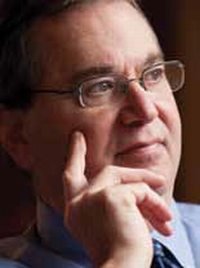
Flier is one of the country’s leading investigators in the areas of obesity and diabetes. His research has produced major insights into the molecular mechanism of insulin action, the mechanisms of insulin resistance in human disease, and the molecular pathophysiology of obesity.
Born in New York City, Flier received a BS from City College of New York in 1968 and an MD from Mount Sinai School of Medicine in 1972, graduating with the Elster Award for Highest Academic Standing. Following residency training in internal medicine at Mount Sinai Hospital from 1972 to 1974, he moved to the National Institutes of Health as a clinical associate. In 1978, he joined the Faculty of Medicine at HMS, serving as chief of the Diabetes Unit at Beth Israel Hospital until 1990, when he was named chief of the hospital’s Endocrine Division.
In 2002, Flier was named chief academic officer of Beth Israel Deaconess Medical Center, a newly created senior position responsible for research and academic programs. He worked with the center’s academic department chairs to ensure the quality and breadth of academic programs, through which most HMS students passed. He also served as the formal liaison to HMS, sitting on the Council of Academic Deans.
Flier has authored more than 200 scholarly papers and reviews and has held a variety of editorial positions. He is a fellow of the Institute of Medicine of the National Academy of Sciences. Flier is also a fellow of the American Association for the Advancement of Science and of the American Academy of Arts and Sciences.
An elected member of the Institute of Medicine and a fellow of the American Academy of Arts and Sciences, Flier’s honors also include the Eli Lilly Award of the American Diabetes Association, the Berson Lecture of the American Physiological Society, and an Honorary Doctorate from the University of Athens. He has been the recipient of a five-year $500,000 Unrestricted Metabolic Research Grant by Bristol-Myers Squibb and the 2003 Edwin B. Astwood Lecture Award from the Endocrine Society. In 2005, he received the Banting Medal from the American Diabetes Association, its highest scientific honor.
Flier, the father of two, lives in Newton, MA with his wife Eleftheria Maratos-Flier, MD, who is also on the faculty of Harvard Medical School and with whom he has collaborated on research in the area of neuroendocrine control of body weight.
Message from the Dean
“Driving Change. Building Momentum. Making History. Since 1872, Harvard Medical School has been the incubator of bold ideas—a place where extraordinary people advance education, science and health care with unrelenting passion.
Whether training tomorrow’s doctors and scientists, decoding the fundamental nature of life, advancing patient care or improving health delivery systems around the world, we are never at rest. Allied with some of the world’s best hospitals, research institutes and a University synonymous with excellence, the School’s mission remains as ambitious as it is honorable: to alleviate human suffering caused by disease. Toward that goal we have made impressive strides, of which just a few are celebrated here. This year, the HMS community—nearly 11,900 faculty, several thousand medical and graduate students, postdoctoral fellows, alumni and health and research professionals—joined forces with Harvard’s other schools as well as institutions in and beyond Boston, pooling their knowledge and creativity more fruitfully than ever before.
Two events within as many weeks underscore the power and promise of this unique community, perhaps the greatest concentration of biomedical intellectual capital on earth.
In September, an HMS graduate won the Nobel Prize in Medicine or Physiology for co-discovering essential steps by which the immune system responds to infection. Sadly, Ralph Steinman, HMS class of 1968, died of cancer shortly before the announcement. Remarkably, he had developed a novel immunotherapy to keep his disease at bay—one based on his own research on the immune system’s dendritic cells.
Later that month, an HMS student was presented with a different sort of honor in immunology—the Jeffrey Modell Prize. This distinction, awarded for the best PhD dissertation in immunology at Harvard, was bestowed by a committee of expert faculty on Salil Garg ’12, who described how dendritic cells digest and then process bacteria in preparation for vanquishing future invaders. Like Steinman, Garg plans to dedicate his career to basic science. He, too, aims to apply his discoveries to the diagnosis and treatment of disease.
Like others at HMS, I am inspired by the triumphs of our graduates. The cycle of learning, research and discovery continues, driven by successive generations of brilliant minds.”
Dean Jeffrey S. Flier


###
* The above information is adapted from materials provided by Harvard University
_________________________________________________________________


















